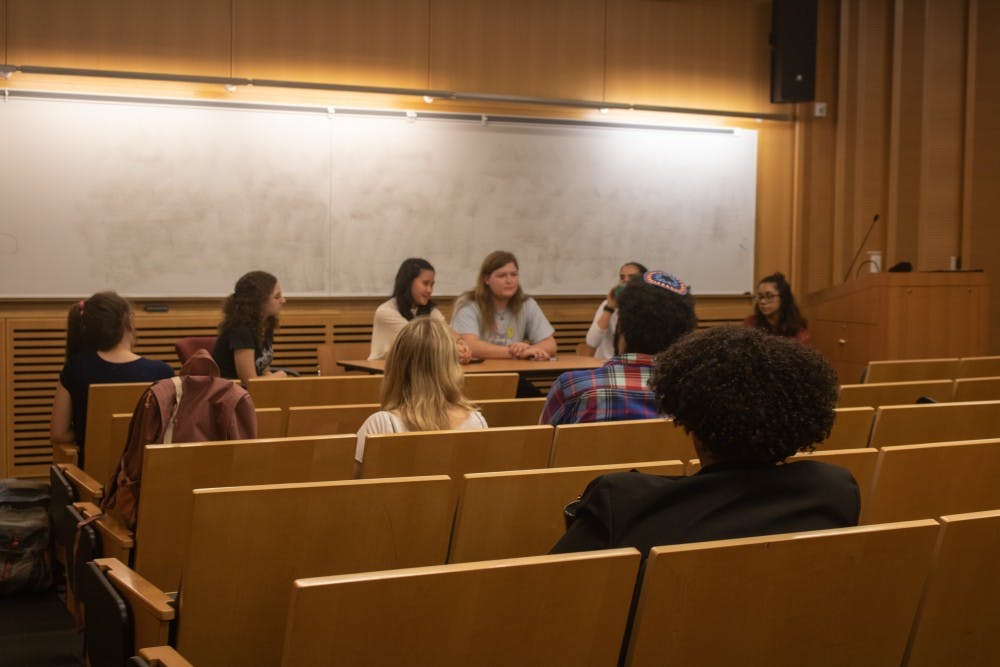Advocates for Disability Awareness (ADA) hosted a panel on Tuesday featuring pre-med students with disabilities. The panelists discussed what it is like to be a student with disabilities at Hopkins, how their experiences interacting with medical professionals affected their career goals and how they felt their disabilities would impact their future in the medical field.
Sophomore Sabrina Epstein, who moderated the panel, said that ADA decided to host the event to address the negative experiences that many ADA members have had with medical professionals.
“A lot of people [in ADA] are pre-med... and also a lot of people at Hopkins are. It kind of started this discussion on what can we do to teach pre-meds how to be more conscious of people with disability, and this was the first thing we’ve done,” Epstein said.
Panelist Tina Nguyen, a senior, said that she had recently had doubts about whether she wanted to go into the field of medicine at all because she had witnessed a lot of health professionals who were not very accommodating toward students with disabilities. She also noted that some professors at Hopkins are not understanding and often refuse to give accommodations to students with disabilities.
Sophomore Brooke Stanicki agreed, mentioning that when she sustained a concussion, professors were accommodating because it was an injury they understood. When it came to her other disabilities, however, professors were less likely to provide accommodations.
Nguyen added that although many professors were understanding, even having one or two bad experiences could be discouraging.
The panelists agreed that the competitive culture at Hopkins makes having a disability particularly difficult.
Stanicki pointed out how for someone who falls behind on homework because of their disability it can be very difficult to catch up. Because of this, she said, many people often drop out of the pre-med track.
Panelist Deeya Bhattacharya, a junior, said that Hopkins lacks in its ability to treat students with disabilities. Oftentimes, she said, the Counseling Center doesn’t want to treat patients with mental disabilities or doesn’t know how.
Panelists also noted that medical professionals also often do not have the skills to treat mental disabilities. Senior Bella Radant said that for EMTs dealing with a mental health emergency, the only guideline is to calm and reassure patients — there are no specific protocol and thus EMTs often don’t know what to do when treating patients with mental disabilities.
Nguyen agreed, and while she understands that it may not be reasonable for every medical professional to have a deep knowledge of every condition, she believes that there are some disabilities that all healthcare workers should know how to accommodate.
The panelists talked about what they wish all pre-med students and doctors knew about a more diverse range of disabilities. Nguyen hopes that healthcare professionals will feel comfortable admitting when they make a mistake, saying that oftentimes doctors don’t want to admit they’re wrong.
Stanicki echoed this sentiment, pointing out that doctors may give the wrong advice, or insufficient treatment, because they receive backlash if they say they don’t know what to do. She believes there is a need to change this culture as well as expand medical education to prevent this from happening.
Radant thinks that pre-med students should receive education on basic patient interaction, and the medical community as a whole should place more emphasis on training around disabilities. She also said that medical professionals should have more access to resources in situations they may be unfamiliar with.
Despite the negative experiences the panelists have had with doctors and professors, Bhattacharya feels that because of her disability, she will have more of an insight into what her patients are going through. Stanicki and Radant agreed, saying that their experiences with disability will allow them to be better care providers and work harder to understand how to help people with mental illnesses.
SJ Burris, a junior who attended the panel, was interested in hearing about the experiences of people with disabilities in the pre-med and medical fields.
“I 100 percent agree that Hopkins is a pretty rough environment for students with disabilities,” she wrote in an email to The News-Letter. “I have witnessed this both personally and through friends with disabilities.”
Junior Madelynn Wellons, who is a member of ADA, hopes that pre-meds who attended the panel learned to be more conscious of people with disabilities they may encounter in their medical career.
“Many people with disabilities have different ways of communicating or may be unable to communicate with speech,” she wrote in an email to The News-Letter. “Rather than assuming their patient is ignoring them, they should respect them and calmly try and figure out if they have alternate ways of communicating.”
Wellons also appreciated how the panelists shed light on the fact that faculty at Hopkins could be more accommodating towards students with disabilities.
“Faculty can... work with a student to figure out the best way to help them achieve academic success as opposed to making them ‘work it out on their own’ and not treat them any differently than any other student who does not have accommodations,” she wrote.

















